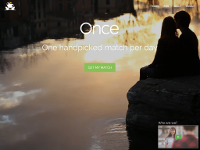The Venmo Effect: Money and Dating
- Friday, July 29 2016 @ 07:58 am
- Contributed by: kellyseal
- Views: 1,733

If you are a millennial, chances are you’ve heard of an app called Venmo, even if you haven’t downloaded it. It’s a peer to peer app owned by PayPal that lets you split things like cab fares and utility bills, to make it easier to share expenses among roommates, family and friends.
But now, there’s a phenomenon reported by The New York Post that claims Venmo is being used by stingy daters to get out of picking up the check.
When you have a Venmo account, it can be linked to a bank account or debit card, or you can keep money directly in your Venmo account to draw from (much like PayPal). The app allows you to connect with people so you can easily split expenses for things like a birthday gift or sharing a hotel room with friends when you go on vacation together.
But daters are starting to take advantage of this app, too. Guys are inviting their dates out to dinner or drinks, paying for it initially, and then after the couple says their goodbyes at the end of the night, the guy sends a Venmo request to ask the girls to cover their half of the bill.
It’s a passive aggressive way of simply asking to split the check. The guy gets to look good buy pretending to buy the drinks while he’s face to face with his date, but then he backs out as soon as she’s gone. This is a good tactic for men who aren’t interested in a second date.
The good news? The dates who are sent the Venmo request for payment can refuse to pay.
Money and dating has always been a sensitive topic in dating. Many men wonder if it’s appropriate to ask to split the check, or if the woman should offer to go dutch. Guys also worry they will look cheap if they don’t pick up the tab, but if they can’t afford this ritual 2-3 nights per week, it can get awkward.
Still, Venmo makes it easy for people to get away with some bad dating behavior. Instead of being upfront and honest about splitting the check, they are avoiding any type of direct confrontation or conflict. It would be much simpler to avoid any confused, hurt feelings if he was upfront and asked his date to split the check before they part ways.
It is similar to the influence texting has had on dating behavior. Texting has made avoidant behavior easier. Instead of having a difficult or uncomfortable conversation in person or over the phone, daters are instead choosing to “ghost” their dates by simply not returning any messages, hoping their dates get the hint that they aren’t interested.
Using Venmo is another avoidance tactic in dating – please, just ask to split the check.



